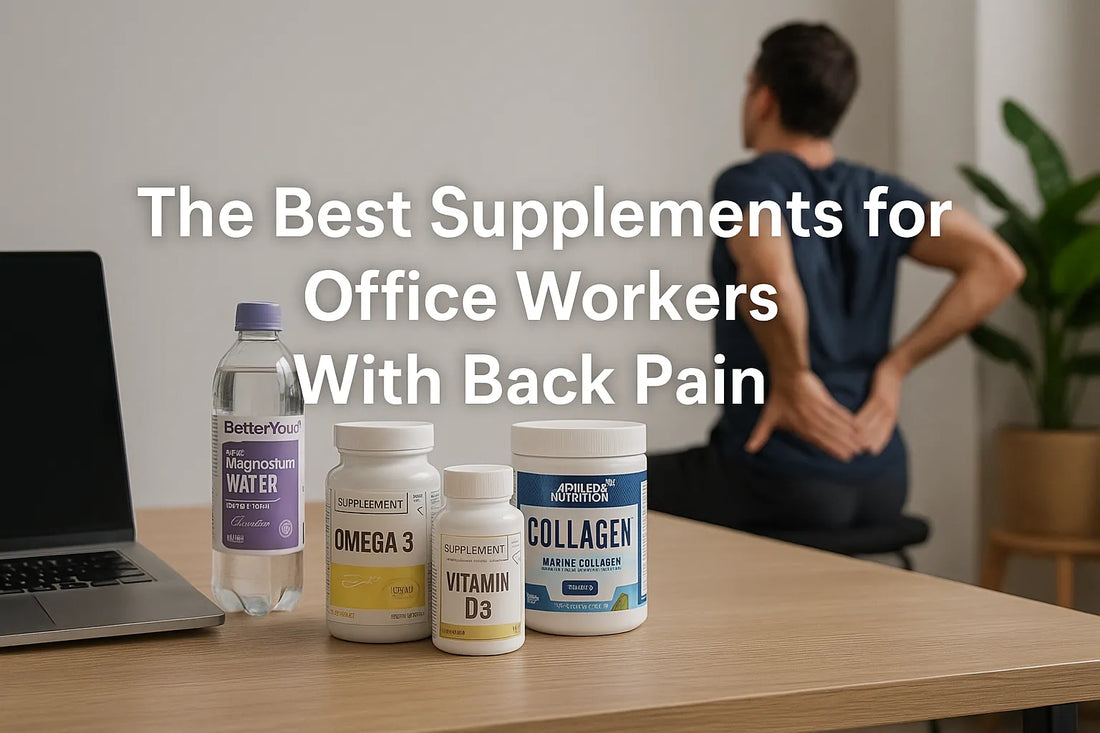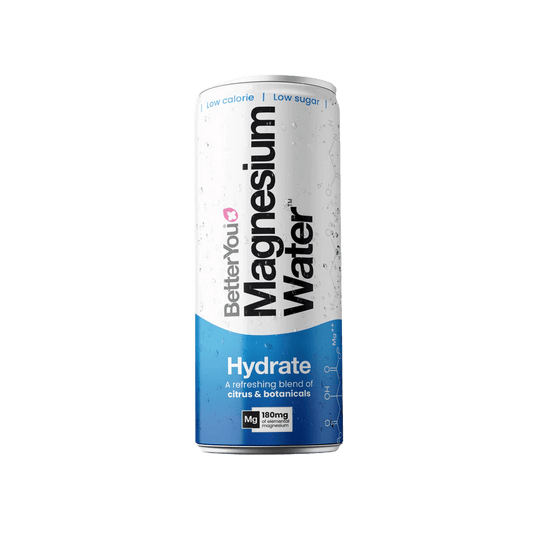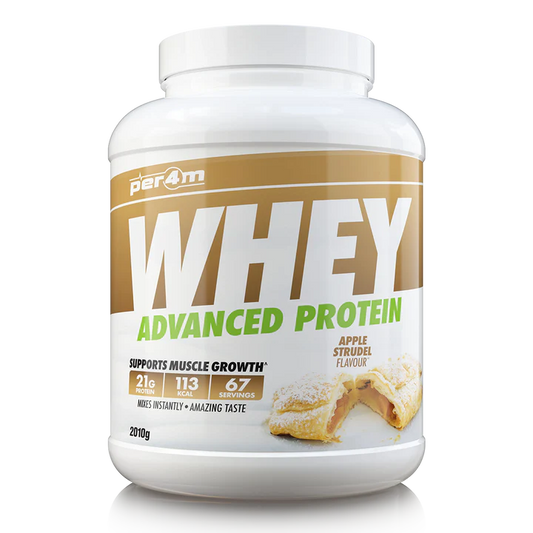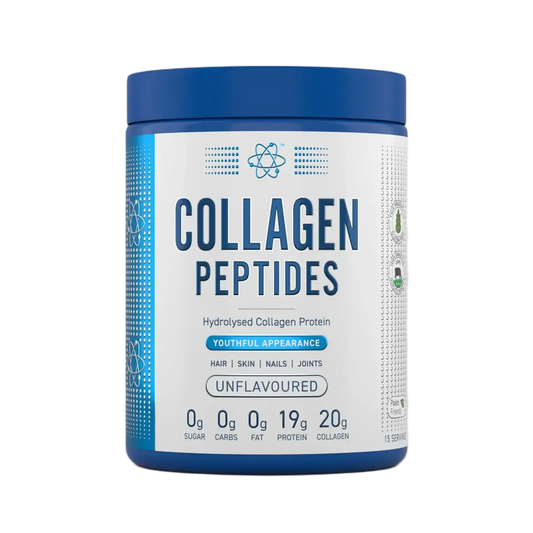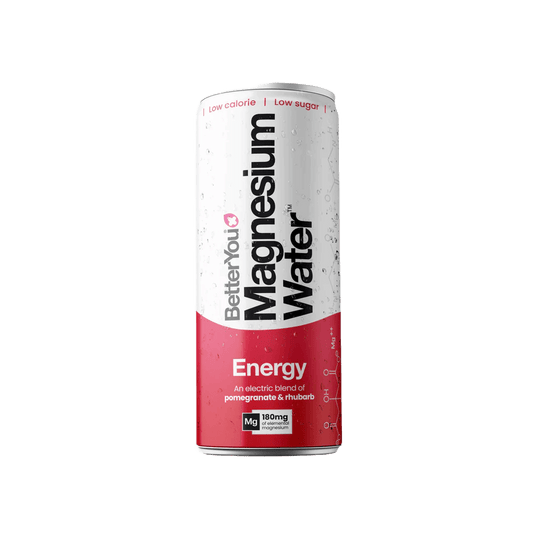Introduction: Why Office Workers Struggle With Back Pain
If you’ve ever stood up from your desk after a long day and felt like your back belonged to someone twice your age, you’re not alone. Back pain is one of the most common complaints among office workers. Hours of sitting, poor posture, and the natural stress of daily life all add up to stiffness, discomfort, and sometimes chronic pain.
While ergonomics, stretching, and regular breaks are essential, nutrition plays a surprisingly big role in supporting spinal health and easing discomfort. The right supplements can reduce inflammation, relax tense muscles, and strengthen the bones and connective tissues that hold your back together. For anyone stuck in a chair nine to five, they can make the difference between dragging yourself through the week and moving comfortably.
1) Which Supplements Help With Back Pain?
Back pain isn’t caused by just one thing — sometimes it’s muscle tension, sometimes weak bones, sometimes inflammation around joints. That’s why a multi-angle approach works best:
-
Anti-inflammatory support: Omega-3 fatty acids calm inflammation in muscles and joints.
-
Muscle relaxants: Magnesium reduces tension, spasms, and cramps.
-
Structural support: Collagen and protein help repair connective tissue.
-
Bone health: Vitamin D and calcium maintain strong vertebrae.
💡 A smart starting point is Supplement Needs Omega 3. Rich in EPA and DHA, it reduces stiffness and swelling in the tissues that often flare up when you sit too long.

2) What Vitamin Am I Lacking if My Back Hurts?
Sometimes back pain is your body waving a deficiency flag. The most common culprits are:
-
Vitamin D → Low levels are linked with musculoskeletal pain and weaker bones.
-
Vitamin B12 → A deficiency can contribute to nerve pain and fatigue.
-
Magnesium → Without enough, muscle cramps and tightness flare up.
If your diet is patchy, you may be missing one or more of these essentials — and sitting at a desk for most of the day only compounds the problem.
💡 Applied Nutrition Multi-Vitamin Complex is an easy way to cover the bases. It provides B vitamins, vitamin D, and minerals in one daily dose, supporting both bone strength and muscle health.
3) Which Magnesium Is Good for Back Pain?
Magnesium is often overlooked, but it’s critical for office workers. It helps regulate muscle contractions and nerve signalling. When levels are low, muscles tighten up, leading to spasms and pain.
For those chained to a desk, this mineral is particularly useful. Tight hip flexors and hamstrings pull on the lower back, creating extra tension. By keeping muscles relaxed, magnesium reduces the daily strain.
💡 BetterYou Magnesium Water is a convenient option. Unlike capsules or powders, it delivers magnesium in an easy-to-drink form that slots neatly into your hydration routine.

4) Can B12 Help With Back Pain?
Vitamin B12 supports the nervous system, and deficiency can sometimes manifest as nerve-related pain in the back or legs (think sciatica-like tingling or numbness). While not everyone with back pain is B12 deficient, those who are can see noticeable relief once levels are restored.
It’s especially important for office workers with restricted diets (vegetarians, vegans) who may struggle to get enough B12 from food alone.
💡 Optimum Nutrition Opti-Men delivers a comprehensive B-vitamin profile, including B12, in a men’s health formula that supports energy, nerve health, and general vitality.

5) Can Vitamin D Supplements Help Back Pain?
If you spend most of your working week indoors, chances are you’re not getting enough sunlight — and therefore not enough vitamin D. Deficiency is strongly associated with bone weakness and chronic musculoskeletal pain, particularly in the lower back.
Vitamin D not only strengthens the spine but also helps regulate calcium absorption, essential for bone density. It’s one of the most important nutrients for long-term spinal health.
💡 Supplement Needs Vitamin D3 is a reliable daily top-up, ensuring office workers maintain the levels necessary for bone and back support.
✅ What We’ve Looked Into So Far
-
Why desk jobs are a breeding ground for back pain.
-
The main supplement categories that support spinal and muscular health.
-
How deficiencies in vitamin D, B12, and magnesium can worsen discomfort.
-
Why anti-inflammatory nutrients like omega-3 are essential for desk workers.
-
Practical products that provide these supports.
And so far, we’ve highlighted five relevant supplements:
- Supplement Needs Omega 3
- Applied Nutrition Multi-Vitamin Complex
- BetterYou Magnesium Water
- Optimum Nutrition Opti-Men
-
Supplement Needs Vitamin D3
🔜 Part 2 will cover:
-
How omega-3 reduces inflammation in the back.
-
Which supplements act as powerful natural anti-inflammatories.
-
Vitamins that directly support bones and spine health.
-
Recovery aids like collagen and glutamine.
-
FAQs + a smart “desk-worker stack” for long-term relief.
The Best Supplements for Office Workers With Back Pain (Part 2)
6) Do Omega-3 Supplements Help With Back Pain?
Omega-3 fatty acids are among the most researched nutrients for reducing inflammation. They work by lowering levels of pro-inflammatory molecules in the body, which is particularly useful for conditions like arthritis, disc inflammation, or general stiffness from too much sitting.
For office workers, omega-3 can help reduce the “tightness” that builds up after hours at a desk, keeping joints and muscles supple.
💡 Supplement Needs Omega 3 is a high-quality source of EPA and DHA, helping ease inflammation in the spine and surrounding tissues.
7) What Is the Most Powerful Anti-Inflammatory Supplement?
If inflammation is at the root of your back pain, a stack of supplements is often more effective than one on its own:
-
Omega-3 → lowers inflammation markers.
-
Collagen peptides → support connective tissue repair and joint cushioning.
-
Glutamine → aids recovery and reduces muscle breakdown.
-
Curcumin (turmeric) → a natural anti-inflammatory (often paired with black pepper for absorption).
💡 Applied Nutrition Collagen Peptides shine here. They provide the amino acids your body uses to maintain ligaments, cartilage, and discs — all vital structures for a healthy back.

8) Which Vitamin Is Good for Bones and Back Pain?
The strength of your spine depends heavily on bone density. Weak bones increase the risk of pain, fractures, and long-term problems like osteoporosis. The key players are:
-
Vitamin D → ensures calcium is absorbed properly.
-
Calcium → the building block of bones.
-
Magnesium → helps regulate calcium use.
For office workers who spend little time outdoors, vitamin D deficiency is especially common. Combined with magnesium, it keeps bones strong and helps stabilise the spine.
💡 Applied Nutrition Multi-Vitamin Complex covers this trifecta, offering vitamin D, magnesium, and a spectrum of bone-supporting nutrients.
9) What Vitamin Strengthens the Spine?
Beyond vitamin D and calcium, collagen is key for spinal health. Your spine isn’t just bones — it’s also cartilage, discs, ligaments, and tendons. These tissues are rich in collagen, which gives them flexibility and strength.
Protein is also vital, as it supports collagen synthesis and maintains lean muscle that stabilises the spine. Weak muscles around the back mean more strain falls directly on the spine itself.
💡 Per4m Advanced Whey Protein is an excellent option here. It delivers complete protein, supporting both muscle growth and collagen production for stronger back support.

10) How to Improve Back Pain Quickly?
There’s no overnight cure, but combining lifestyle and supplements is the fastest route to relief:
-
Move often → even standing up every 30 minutes helps circulation.
-
Stretch daily → especially hips, hamstrings, and thoracic spine.
-
Strengthen core and glutes → they act like a support belt for your spine.
-
Supplements → provide the building blocks for recovery and long-term resilience.
For muscle repair and resilience, glutamine is underrated. It supports muscle recovery after strain and helps reduce the soreness that builds from static positions.
💡 Per4m Glutamine is a smart add-on for desk workers, ensuring muscles stay resilient even when movement is limited.
🧠 FAQ: Supplements for Office Workers With Back Pain
1. What supplements help with lower back pain?
Omega-3, magnesium, collagen, vitamin D, and B12 are most effective.
2. Are supplements enough to fix posture issues?
No — posture requires ergonomic setup, stretching, and exercise. Supplements support healing but won’t correct slouching.
3. Do omega-3 supplements really help with back pain?
Yes — they’re clinically proven to reduce inflammation and stiffness in joints and muscles.
4. Can vitamin D deficiency cause back pain?
Absolutely — deficiency is strongly linked to musculoskeletal pain and weakened bones.
5. Which is better for back tension, magnesium or ashwagandha?
Magnesium directly relaxes muscles. Ashwagandha reduces stress-driven tension, so together they’re highly effective.
Conclusion: Building a Back-Friendly Supplement Stack
Back pain doesn’t have to be an inevitable part of office life. By combining smart lifestyle changes with targeted supplements, you can protect your spine, reduce inflammation, and feel more comfortable at your desk.
The office worker back-pain stack looks like this:
-
Supplement Needs Omega 3 → anti-inflammatory support.
-
BetterYou Magnesium Water → muscle relaxation and cramp prevention.
-
Applied Nutrition Collagen Peptides → connective tissue repair.
-
Supplement Needs Vitamin D3 → stronger bones and spinal health.
-
Optimum Nutrition Opti-Men → comprehensive B-vitamin coverage.
-
Per4m Advanced Whey Protein → muscle and collagen synthesis.
-
Per4m Glutamine → muscle recovery and resilience.
Together, these supplements create a solid foundation for desk workers who want to feel less stiff, more mobile, and healthier over the long term.

